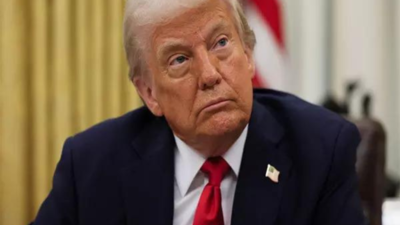Business
US Appeals Court Declares Most Trump Tariffs Illegal, Limits Presidential Power

A US federal appeals court has determined that the majority of tariffs imposed by former President Donald Trump using emergency powers were illegal. This ruling challenges the foundation of Trump’s trade policy and may lead to a confrontation in the Supreme Court. The decision, announced on October 6, 2023, underscores the limits of presidential authority in implementing tariffs.
The US Court of Appeals for the Federal Circuit in Washington, DC, addressed two specific sets of tariffs: the “reciprocal” duties established in April as part of Trump’s trade conflict and another series announced in February targeting China, Canada, and Mexico. However, the ruling does not affect other tariffs set by Trump under different legal frameworks, such as those on steel and aluminum imports.
In its ruling, the court highlighted that while the President has significant authority to respond to declared national emergencies, it does not include the explicit power to impose tariffs. The court stated, “The statute bestows significant authority on the President to undertake a number of actions in response to a declared national emergency, but none of these actions explicitly include the power to impose tariffs, duties, or the like, or the power to tax.”
The court found that Trump had exceeded his authority under the International Emergency Economic Powers Act (IEEPA), which dates back to 1977 and has traditionally been used for sanctions and asset freezes. Trump invoked the IEEPA to justify his tariffs, citing a national emergency due to ongoing US trade deficits and the flow of illicit drugs across borders. The administration contended that the act’s provision to “regulate” imports encompassed the imposition of tariffs.
The appeals court rejected this interpretation, noting, “It seems unlikely that Congress intended, in enacting IEEPA, to depart from its past practice and grant the President unlimited authority to impose tariffs. The statute neither mentions tariffs (or any of its synonyms) nor has procedural safeguards that contain clear limits on the President’s power to impose tariffs.”
The ruling has significant implications for US trade policy and could reshape the landscape of international commerce. Since taking office, Trump has relied heavily on tariffs as a core instrument of foreign policy, leveraging them to influence trading partners and negotiate new trade agreements. While these tariffs have occasionally led to economic concessions, they have also contributed to increased volatility in financial markets.
As the ruling is likely to be appealed, the outcome will be closely monitored, especially considering the potential for the Supreme Court to weigh in on the scope of presidential powers regarding trade. This decision marks a pivotal moment in the ongoing debate over the extent of executive authority in shaping economic policy.
-

 World4 months ago
World4 months agoSBI Announces QIP Floor Price at ₹811.05 Per Share
-

 Lifestyle4 months ago
Lifestyle4 months agoCept Unveils ₹3.1 Crore Urban Mobility Plan for Sustainable Growth
-

 Science3 months ago
Science3 months agoNew Blood Group Discovered in South Indian Woman at Rotary Centre
-

 World4 months ago
World4 months agoTorrential Rains Cause Flash Flooding in New York and New Jersey
-

 Sports3 months ago
Sports3 months agoBroad Advocates for Bowling Change Ahead of Final Test Against India
-

 Top Stories4 months ago
Top Stories4 months agoKonkani Cultural Organisation to Host Pearl Jubilee in Abu Dhabi
-

 Science4 months ago
Science4 months agoNothing Headphone 1 Review: A Bold Contender in Audio Design
-

 Top Stories4 months ago
Top Stories4 months agoAir India Crash Investigation Highlights Boeing Fuel Switch Concerns
-

 Sports3 months ago
Sports3 months agoCristian Totti Retires at 19: Pressure of Fame Takes Toll
-

 Business4 months ago
Business4 months agoIndian Stock Market Rebounds: Sensex and Nifty Rise After Four-Day Decline
-

 Politics4 months ago
Politics4 months agoAbandoned Doberman Finds New Home After Journey to Prague
-

 Top Stories4 months ago
Top Stories4 months agoPatna Bank Manager Abhishek Varun Found Dead in Well









